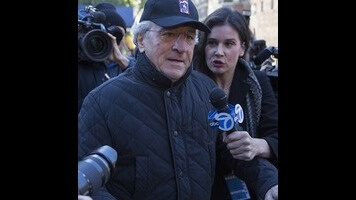The Bernie Madoff story staggers the imagination: In the biggest Ponzi scheme of all time, one man defrauded his family, friends, and thousands of investors for several billion dollars. Such an epic and tragic saga needs some strong characters to pull it off, and director Barry Levinson and Robert De Niro make a somewhat admirable attempt. But it turns out that Bernie Madoff may be too slippery a character for even these vets to get a firm handle on, leaving us with a biopic that raises more questions than it actually answers.
We’re used to seeing De Niro playing larger-than-life characters, and he fits the Bernie Madoff role well, especially in flashbacks: A devoted family man who examines every detail at his own 50th-anniversary party, down to the cleanliness of the plates and the freshness of the lobsters. But Madoff is hiding a secret, a Ponzi scheme that he created sometime after Black Tuesday, bilking people out of unbelievable amounts of money. Because of Bernie’s charm, his supposed loyalty and devotion, and the fact that people they trust are doing the same thing, his victims handed him their entire life savings with barely a second thought. A scene where Bernie successfully plays hard to get to snare an investor worth hundreds of millions would almost be entertaining if it weren’t so utterly corrupt.
Levinson tries to show the victims’ side: impassioned testimonies at Madoff’s trial, some black-and-white stories of the people who lost everything, some of whom subsequently took their own lives. But the maddening questions about the case remain unanswered: Why and how did he do this to people like longtime friends, not to mention his wife’s sister? And a question that’s almost as mysterious, as it’s called in a 60 Minutes episode that Madoff watches here: What happened to all that money? When Madoff’s assets were liquidated before he went to prison, he was worth about $80 million. There’s a hell of a lot left unaccounted for from all those billions, and at the end of the film we’re just as in the dark about that missing money as when we began it.
We might have slightly more insight into Bernie’s mindset, thanks to the overarching narrative of an interview between Madoff and Diana Henriques, who wrote the book that the film is based on. She functions as the audience stand-in: When Madoff says that his clients are complicit in his scheme because they’re “greedy,” she says she can’t believe that he of all people could accuse someone else of being greedy. But it’s like an assault on a shark with a feather duster; he remains entirely unperturbed. There’s a dramatic moment when Madoff is incensed that The New York Times would compare him to serial killer Ted Bundy—different kinds of crimes, sure, but Madoff arguably ruined more lives—and he wants to know if his interviewer thinks he’s a sociopath. The question isn’t answered, but it doesn’t even need to be raised: Only a sociopath could pull off what he did with so little remorse.
No more insightful, but at least more entertaining, is Hank Azaria’s interpretation of Frankie Dipascali, Madoff’s main manager of the shady goings-on on the 17th floor of his firm. As portrayed by Azaria, he’s crude, whereas the Madofff sons, Andrew (Nathan Darrow) and Mark (Alessandro Nivola) strive for elegance. In his testimony, and in his dealings as the only one who knows what Madoff is really up to, Azaria’s Frankie is compelling, but the portrayal suffers from some strange choices by Levinson. For example, the character of Frankie gets completely dropped about halfway through the movie, so we never find out what happens to him at the end of the scandal. There’s also a bizarrely long diatribe at the Madoffs’ anniversary party where Frankie classifies female genitalia by comparing different types of “pussies” to different makes of cars. It’s interminable. One such description would have more than sufficed, but in his 132-minute movie Levinson is compelled to give us four detailed examples of this painfully misogynistic analogy.
There are other similarly unfortunate choices, wherein the director might have done well to rein it more. The black-and-white victim testimonies multiply into smaller pictures that then compile into a photograph of De Niro as Madoff—an effect meant to be striking, but comes off like a graphic design grad-school project. A dramatic tension-building sequence before a tragedy befalls one of the Madoff sons is textbook clichéd; what’s worse is that we never see Madoff’s reaction to the tragedy. A dream sequence after Madoff takes a bunch of Ambien also seems to go on forever, and adds no real information.
Those last two points are the most problematic. This movie tries to steer most of the audience’s sympathy toward Madoff’s wife and sons, which it maintains were entirely ignorant of his massive crimes—but never lets us into Madoff the man. Michelle Pfeiffer talked with the real Ruth Madoff, which may help explain why her Ruth is a three-dimensional character, destroyed by the man she thought she knew. But De Niro here might as well be playing ”Robert De Niro, financier,” for all the interpretation we get, barely any inclination as to how Madoff felt about the hell he put his family—let alone the thousands of people whose lives he ruined—through. At the end of the film, we might have a better understanding of how this giant Ponzi scheme unfolded, but we still have no idea why it happened—a significant shortcoming for an HBO movie with this kind of pedigree.









































